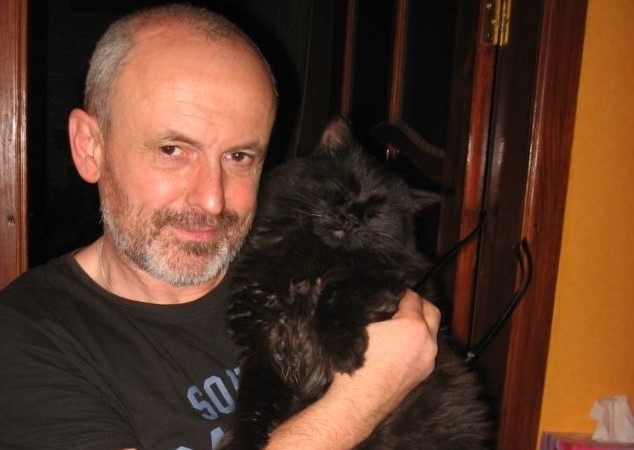Fears for the life of tortured Ukrainian hostage held by Russian-controlled Donbas militants

Valery Matiushenko’s family have heard nothing from or about him since 8 October, and it appears that the Russian-controlled militants are deliberately hiding him. Since at the time of his last allowed phone call, he had a high temperature and was almost unable to eat, his wife Tetyana is desperately worried. 56-year-old Matiushenko has now been held hostage in the so-called ‘Donetsk people’s republic’ [DPR] since July 2017, with the first 10 months being subjected to torture in the notorious Izolyatsia secret prison in Donetsk.
Since a farcical ‘DPR trial’ on 28 March 2019 found Matiushenko ‘guilty’ of spying for Ukraine’s SBU [Security Service] and sentenced him to 10 years, he has been held at the harsh regime prison colony No. 32 in Makiivka, together with 53 other Ukrainian hostages and POWs, also imprisoned for alleged ‘spying’.
The conditions have always been appalling, with the men scarcely allowed out of the barracks and completely deprived of any medical care. The situation is, however, rapidly becoming critical since many of the men have all the symptoms of Covid-19, and essentially no way of protecting themselves. You cannot avoid infection when the men are held in cramped conditions, where there is around 1 m² per person and no ventilation. The conditions are also likely to be totally unsanitary, with no forms of disinfectant available. Due to the pandemic, no visits at all are permitted, and the prison is not allowing relatives to pass on parcels of food and medication to the hostages. There is also scarcely any heating, without coal or logs to burn. Over the last three years, relatives had managed to organize the supply of logs themselves, but that has now become impossible.
Even those hostages who were in good health before have been badly weakened by torture and by the conditions in captivity This alone means that many are in the group greatest at risk.
Matiushenko was already in his 50s when seized by the militants and suffered from Tourette syndrome, a neurological disorder which, in ordinary times, manifested itself only in a nervous tic. Due do the torture he endured, this has been causing muscular spasms which are physically and psychologically draining, and can cause breathing difficulties. Matiushenko also has an inguinal hernia which can block the blood supply to parts of the intestine unless treated. One of the other hostages is, by profession, a surgeon, and was able to manually reduce the hernia during an earlier emergency, but without proper treatment in hospital conditions this condition is life-threatening.
Earlier, the hostages were officially allowed two telephone calls a week, lasting 15 minutes. This swiftly turned into calls of from one to three or four minutes, however it was, at least, contact. Since 8 October, after Valery was able to briefly describe his condition, nothing at all has been heard. She has spoken with the families of men who are still allowed this small amount of contact, and believes that the men are being prevented from mentioning her husband.
Matiushenko, who never concealed his pro-Ukrainian position, has already been passed over in all three exchanges of hostages since his seizure by the militants on 15 July 2017, and there are very real grounds for concern, especially given the torture that he endured for such a long time at Izolyatsia. Details about the conditions at Izolyatsia, as well as about Matiushenko’s treatment, mainly come from former hostages who were released in the exchanges. During the ten months in that secret prison which former hostages describe as a concentration camp, Matiushenko was held in the so-called internal prison at Izolyatsia where he was subjected to what Tetyana describes as “insane levels of torture”, including electric shocks, beatings and mock executions. Although the torture is supposedly to extract ‘confessions’, former inmates, such as Halyna Hayeva, have said that some of the torturers did it “for entertainment”.
Matiushenko was initially held in what is colloquially referred to as ‘stakan’ or a glass. This is a confined space, of around 1 m², in which a person can only stand or squat. There he was left for several days without food or drink. He was then taken to a cell where they began torturing him with electric currents. We know from other victims that they are taken to a basement, undressed and then tied with the use of scotch tape to a metal table. They connect electric wires to parts of the victim’s body, then pour water over him or her and then turn the electric current on. Victims consider themselves ‘lucky’ if the electric wires are attached ‘only’ to earlobes or to fingers, but very often they are attached to genital parts, causing particularly unendurable pain. Any such use of electric shocks is extremely dangerous and in Matiushenko’s case has resulted, his wife has learned, in damage to internal organs and to the central nervous system.
Valery Matiushenko is one of at least two hostages (together with Olena Fedoruk) from Kalmiuske (formerly Komsomolske), a city 50 kilometres south of Donetsk and Ilovaisk and just over 30 kilometres from the border with Russia. Witnesses are adamant that much of the shelling they experienced in 2014 came from the Russian Federation, and that after the battle near Ilovaisk (at the end of August 2014), Russian military arrived, with their own technology, in the city. Russia has a great deal to conceal about the war that it brought to Ukraine, and the Russian military personnel deployed in cities like Kalmyuske. It is, in fact, likely that the need to conceal Russia’s military involvement explains why both Matiushenko and Fedoruk remain imprisoned to this day.





